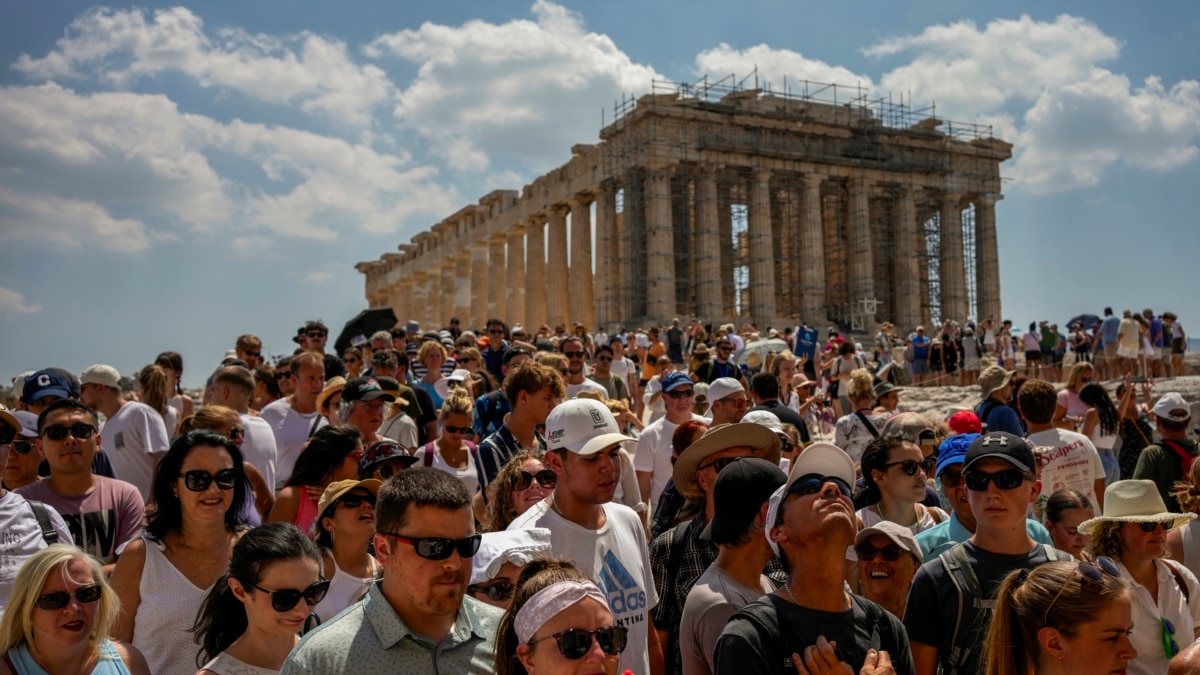Tourists are waiting more than two hours to visit the Acropolis in Athens.
Taxi lines at Rome’s main train station are running just as long. And so many visitors are concentrating around St. Mark’s Square in Venice that crowds get backed up crossing bridges even on weekdays.
After three years of pandemic limitations, tourism is expected to exceed 2019 records in some of Europe’s most popular destinations this summer, from Barcelona and Rome, Athens and Venice to the scenic islands of Santorini in Greece, Capri in Italy and Mallorca in Spain.
While European tourists edged the industry toward recovery last year, the upswing this summer is led largely by Americans, boosted by a strong dollar and in some cases pandemic savings.
Many arrive motivated by “revenge tourism” — so eager to explore again that they’re undaunted by higher airfares and hotel costs.
Americans appear equally unperturbed by recent riots in Paris and other French cities. There was a small drop in flight bookings, but it was mainly for domestic travel.
The return of mass tourism is a boon to hotels and restaurants, which suffered under COVID-19 restrictions.
But there is a downside, too, as pledges to rethink tourism to make it more sustainable have largely gone unheeded.
The pandemic should have taught us a lesson, said Alessandra Priante, director of the regional department for Europe at the U.N. World Tourism Organization.
Instead, she said, the mindset is about recuperating the cash. Everything is about revenue, about the here and now.
The mayor of Florence is stopping new short-term apartment rentals from proliferating in the historic center, which is protected as a UNESCO heritage site, as mayors of Italy’s other art cities call for a nationwide law to manage the sector.
Elsewhere, the anti-mass tourism movements that were active before the pandemic have not reappeared, but the battle lines are still being drawn: graffiti misdirected tourists in Barcelona away from instead of toward the Gaudi-designed Park Guell.
Despite predictable pockets of overtourism, travel to and within Europe overall is still down 10% from 2019, according to the World Tourism Organization.
That is partly due to fewer people visiting countries close to the war in Ukraine, including Lithuania, Finland, Moldova and Poland.
In addition, Chinese visitors have not fully returned, with flights from China and other Asia-Pacific countries down 45% from 2019, according to a travel data company.
Tourism-dependent Greece expects 30 million visitors this year, still shy of 2019’s 34 million record. Still, the number of flights are up so far, and tourist hotspots are taking the brunt.
The Culture Ministry will introduce a new ticketing system for the Acropolis this month, providing hourly slots for visitors to even out crowds.
But no remedy is being discussed for the parking line of cruise ships on the islands of Mykonos and Santorini on busy mornings.
Spain’s tourism minister, Héctor Gómez, called it a historic summer for tourism, with 8.2 million tourists arriving in May alone, breaking records for a second straight month.
Still, some hotel groups say reservations slowed in the first weeks of summer, owing to the steep rise in prices for flights and rooms.
The rising appetite for long-haul travel from America is the continued result of the ‘revenge travel’ boom caused by the pandemic lockdowns, said Tim Hentschel, CEO of a booking site.
Americans have pushed arrivals in Italian bucket-list destinations like Rome, Florence, Venice and Capri above pre-pandemic levels, according to an Italian hotel association.
They bring a lot of pent-up buying power: U.S. tourists in Italy spent 74% more in tax-free indulgences in the first three months of the year, compared with same period of 2019.
Tags: Tim Hentschel, Italian hotel association, Long-haul travel, Tourists, UNESCO Heritage Site, World Tourism Organization (UNWTO)
